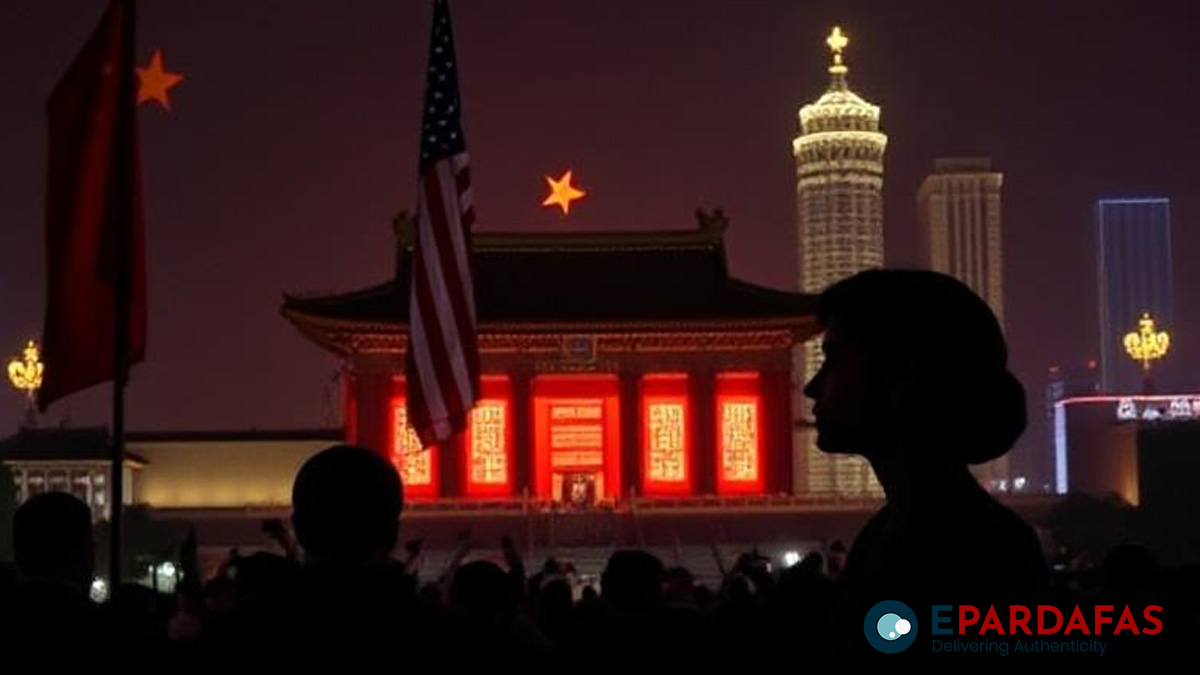
U.S. Imposes Ban on Romantic Relationships Between Government Personnel and Chinese Citizens
The United States has introduced a strict new policy prohibiting American government personnel stationed in China from engaging in romantic or sexual relationships with Chinese citizens. The directive, which also applies to family members and contractors holding security clearances, marks a significant tightening of restrictions on U.S. officials in China.
Multiple sources with direct knowledge of the policy revealed that the rule was implemented in January by outgoing U.S. Ambassador Nicholas Burns, just before his departure. The sources, who spoke on the condition of anonymity due to the confidential nature of the policy, indicated that while some U.S. agencies already had strict guidelines regarding personal relationships, a comprehensive non-fraternization policy of this scale has not been seen since the Cold War era.
Previously, a limited version of the rule had been in place, restricting U.S. personnel from engaging in relationships with Chinese citizens employed at the U.S. Embassy and consulates. However, the updated directive broadens the prohibition to include all Chinese citizens in China. It remains unclear how the U.S. government specifically defines “romantic or sexual relationships” under the new policy.
Background and Implementation
Discussions surrounding the ban reportedly began last summer when members of the U.S. Congress voiced concerns that existing restrictions on personal relationships between American officials and Chinese citizens were insufficient. The House Select Committee on the Chinese Communist Party, which has been actively monitoring security risks related to China, did not provide a comment on the new policy.
The ban applies to all U.S. diplomatic missions in mainland China, including the embassy in Beijing and consulates in cities such as Shanghai, Guangzhou, Wuhan, and Shenyang, as well as the consulate in Hong Kong. It does not, however, extend to U.S. personnel stationed outside of China.
Exceptions may be granted to those who were already in a relationship with a Chinese citizen before the implementation of the rule. However, individuals seeking an exemption must formally apply for approval. If denied, they are left with two choices: either terminate the relationship or leave their position in China. Violators of the policy will be subject to immediate expulsion from the country.
The policy was communicated verbally and electronically to affected personnel in January but has not been publicly announced by the U.S. government. The State Department has declined to comment on the matter, while the National Security Council has referred all inquiries back to the State Department. Former Ambassador Burns, now serving as vice chair at The Cohen Group, a Washington-based consultancy, has not responded to requests for comment.
Echoes of Cold War-Era Policies
The move is reminiscent of Cold War-era security measures when intelligence agencies frequently used personal relationships as a means of gathering sensitive information. Historically, many nations—including the U.S. and China—have been cautious about foreign diplomats forming close personal ties with locals due to espionage risks.
During the late 1980s, the U.S. government implemented strict relationship restrictions for American personnel stationed in China and Soviet bloc countries after a case involving a U.S. Marine in Moscow, who was reportedly seduced by a Soviet intelligence operative. These restrictions were eventually eased after the Soviet Union collapsed in 1991.
Prior to the latest directive, U.S. personnel in China were required to report any intimate relationships with Chinese citizens to their supervisors, but there was no outright ban. Security experts and former diplomats assert that China continues to use so-called “honeypots”—a tactic where intelligence operatives build relationships with foreign officials to extract classified information.
Security Concerns and Diplomatic Tensions
China’s Ministry of State Security (MSS), which oversees intelligence and counterintelligence operations, has long been suspected of attempting to gather information through human relationships. Peter Mattis, a former CIA analyst and president of The Jamestown Foundation, a Washington-based think tank, has pointed out that Chinese intelligence operations do not solely rely on spies but also coerce ordinary citizens to collect intelligence.
Mattis noted that any Chinese citizen dating an American diplomat could become a target for state pressure or blackmail. He emphasized that the new rule may reflect an increase in aggressive attempts by China to infiltrate U.S. diplomatic circles.
“The MSS is willing to leverage any human connection that a target has to collect intelligence,” Mattis stated. “This rule change suggests the MSS has gotten a lot more aggressive at trying to access the embassy and U.S. government.”
China’s foreign ministry declined to comment directly on the policy, instead stating in a written response that questions on the matter should be directed to the U.S. government.
China’s Own Restrictions on Personnel
While the U.S. tightens controls on its diplomatic staff in China, Beijing has also ramped up restrictions on its own personnel overseas. Chinese regulations have increasingly limited government employees’ interactions with foreigners, and strict rules are in place regarding promotions for officials with foreign spouses.
Chinese diplomats are typically prohibited from staying in one foreign country for an extended period, requiring them to return to China after a set time. Meanwhile, many government agencies, including the Chinese foreign ministry, have strict policies barring officials from engaging in romantic or sexual relationships with foreign nationals. Members of the Chinese military and police forces are often forbidden from traveling abroad without special permission from superiors.
With geopolitical tensions between Washington and Beijing continuing to rise—spanning issues from trade disputes to military activities in the Indo-Pacific—the U.S. government’s move reflects broader concerns about safeguarding American intelligence interests in China. However, the extent to which the new policy will affect diplomatic relations and personnel operations remains to be seen.
Input from Agency













Comments